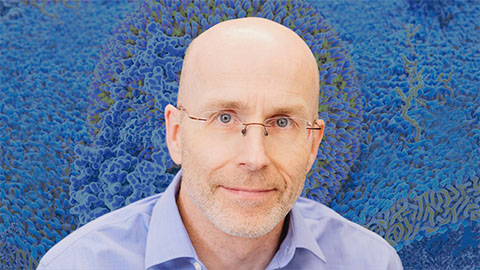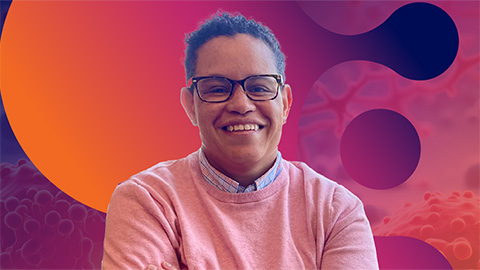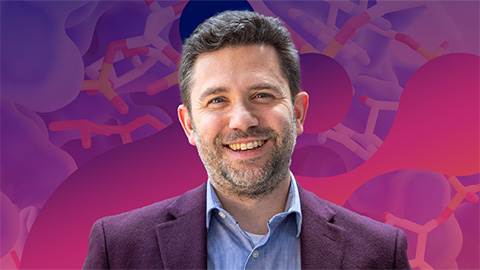#Discover BMB symposia highlight cutting-edge science
The themes of the 11 symposia at Discover BMB are centered on the latest advances and hottest trends in biochemistry and molecular biology. Hear leading experts discuss their newest discoveries and approaches.
The focus on metabolism includes sessions on “Biochemistry of elemental cycling,” a theme that centers on microbes and our environment, and “Advances in organismal and cellular metabolism,” centering on physiology and disease.
Critical biomolecules of the cell are identified, engineered and harnessed for myriad applications in sessions on “Frontiers in carbohydrate synthesis and recognition,” “Lipid dynamics and signals in membrane and protein structure,” and “Regulation of RNA.”
Phase separation and the formation of biomolecular condensates are among the hottest topics in BMB. Their impact is reflected by their presence in multiple sessions. These sessions, providing diverse perspectives using different systems, are “Protein machines and disorder,” “Organelles, mechanisms and phase properties of cellular quality control,” and “Cell signaling — new tools and emerging concepts.”
Over the past five years, artificial intelligence and machine learning, better known as AI and ML, have taken a front seat in our ability to perform and analyze BMB research. The scientific theme “AI and ML in structural biology, drug design and systems biology” highlights the ways in which researchers employ these tools. At the same time, AI and ML can present challenges, as underscored in the theme “Bias in, bias out in data science.” The “Education and professional development” session will include talks devoted to the uses of AI in BMB education.
Discover BMB symposia themes and organizers
(speakers and schedules are subject to change)
Advances in organismal and cellular metabolism
Nika Danial, Harvard Medical School, and Gary Patti, Washington University in St. Louis
AI and ML in structural biology, drug design and systems biology
Rommie E. Amaro, University of California, San Diego, and Celia Schiffer, University of Massachusetts Medical School
Bias in, bias out in data science
Allison C. Augustus–Wallace, Louisiana State University Health Sciences Center New Orleans
Biochemistry of elemental cycling
Jennifer Dubois, Montana State University, and Sean Elliott, Boston University
Cell signaling — new tools and emerging concepts
Kevin Gardner, City University of New York, and Jin Zhang, University of California San Diego
Education and professional development
Margaret Kanipes, North Carolina Agricultural and Technical State University
Frontiers in carbohydrate synthesis and recognition
Xi Chen, University of California at Davis, and Catherine Grimes, University of Delaware
Lipid dynamics and signals in membrane and protein structure
Michael Airola, Stony Brook University, and Robert V. Stahelin, Purdue University
Organelles, mechanisms and phase properties of cellular quality control
W. Mike Henne, University of Texas Southwestern Medical Center at Dallas, and Cheryl Kerfeld, Michigan State University
Protein machines and disorder
Ivaylo Ivanov, Georgia State University, and Yan Jessie Zhang, University of Texas at Austin
Regulation of RNA
Daniel Dominguez, University of North Carolina at Chapel Hill, and Stacy Horner, Duke University
Enjoy reading ASBMB Today?
Become a member to receive the print edition four times a year and the digital edition monthly.
Learn moreFeatured jobs
from the ASBMB career center
Get the latest from ASBMB Today
Enter your email address, and we’ll send you a weekly email with recent articles, interviews and more.
Latest in Science
Science highlights or most popular articles

Redefining lipid biology from droplets to ferroptosis
James Olzmann will receive the ASBMB Avanti Award in Lipids at the ASBMB Annual Meeting, March 7–10, just outside of Washington, D.C.

Women’s health cannot leave rare diseases behind
A physician living with lymphangioleiomyomatosis and a basic scientist explain why patient-driven, trial-ready research is essential to turning momentum into meaningful progress.

Life in four dimensions: When biology outpaces the brain
Nobel laureate Eric Betzig will discuss his research on information transfer in biology from proteins to organisms at the 2026 ASBMB Annual Meeting.

Fasting, fat and the molecular switches that keep us alive
Nutritional biochemist and JLR AE Sander Kersten has spent decades uncovering how the body adapts to fasting. His discoveries on lipid metabolism and gene regulation reveal how our ancient survival mechanisms may hold keys to modern metabolic health.

Redefining excellence to drive equity and innovation
Donita Brady will receive the ASBMB Ruth Kirschstein Award for Maximizing Access in Science at the ASBMB Annual Meeting, March 7–10, just outside of Washington, D.C.

Mining microbes for rare earth solutions
Joseph Cotruvo, Jr., will receive the ASBMB Mildred Cohn Young Investigator Award at the ASBMB Annual Meeting, March 7–10, just outside of Washington, D.C.
